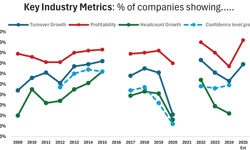It started with lunch, which is I suppose only appropriate for a publisher in the eating and drinking out market.
The ‘lunchee’ was an analyst for the sector, working at one of the large investment banks and bemoaning the lack of hard sales data available in a sector worth in excess of £50bn annually. His job of analysing and recommending investment opportunities in the eating and drinking out market was being compromised, he believed, by the absence of credible, independent, market data and he wanted to know if we could help.
Good standing in the industry
Peach Factory was not a data specialist but our publishing and events business had a track record in the sector. Peach Factory’s CEO, Peter Martin, was something of an industry veteran and over his long career in the eating and drinking out sector had held an impressive variety of roles, job titles and guises including journalist, editor, publisher, media-owner, exhibition / conference / awards organiser, industry commentator and co-founder of one of the industry’s trade bodies… to name but a few. The result of his long (and varied) service was an encyclopaedic contacts book and long standing relationships with many of sector’s leading players.
It also helped that the Peach team had set up the financial newsletter for the sector – M&C Report – fifteen years earlier and was widely credited with helping raise the profile of the sector with the investment community at large and both formally and informally introducing the money men (keen to tap into a growing, dynamic retail sector) and the pub and restaurant operators who needed capital to build their brands.
So while the approach was flattering, it was not as random as it might first appear. Peach certainly had the contacts and at the right level to get the debate started. Many of the market’s CEOs, MDs and finance chiefs agreed that the sector needed credible market data but could not agree on how to collect it, how to resolve the different financial reporting methodologies and, critically, to whom they might entrust their highly sensitive sales data. Previous attempts by large, reputable accountancy and banking firms had failed in an attempt to launch a sales tracker service because non-clients declined to share their data. It was ultimately an issue of trust.
A credible partner
Peach Factory was independent, non-partisan and its management well known to the industry’s movers and shakers. With high-level access to senior executives running the big chains, we were able to leverage some 30 years of “trusted advisor” status to bring the key decision makers together, to build a case for collaboration and to present the benefits of the availability of robust sector sales data. The companies needed better information to benchmark their own results in the market and as most were either private equity funded or stock market listed, they also needed better data when dealing with research-hungry investors and analysts. As ‘honest brokers’ of the data, the Peach team were perfectly positioned to steer the group forward. In short, the operators trusted us with their data and the ability to deliver a credible product.
For Peach Factory, the sales tracker was a superb opportunity to provide genuinely unique, business-critical data for the sector. Whilst individual company data remained the property of the participants, the copyright of the aggregated results belonged to Peach Factory. There would be only one sales tracker in the market and first mover advantage combined with trusted advisor status meant Peach would own this crucial data asset that would position us at the heart of the industry.
The investment bank UBS (the workplace of our lunching analyst) agreed to fund a ‘pilot project’ to test the concept and build a beta of the data collection site. The Peach team met with the industry’s leading players to sell the concept and to set up a working party of twelve companies to help develop the Tracker.
We secured some high profile companies from the get go, including the UK’s largest pub group Mitchells & Butlers (Toby / Harvester / All Bar One), Gondola Group (Pizza Express, Zizzi, ASK), Wagamama, Pizza Hut and Whitbread to name a few. However, it was far from plain sailing and the phrase “herding cats” springs to mind as we gradually built consensus on issues of confidentiality and reporting protocols.
The process took a good six months of management time. It was however time well spent as the credibility and success of the Tracker depended on us getting these details right from the start.
Not every company wanted to play ball. Issues of confidentiality and sensitivity about sharing sales information, particularly among some publicly quoted companies, proved a stumbling block and we had to progress without some of the participants we’d targeted. Nonetheless, the group of twelve provided a credible base of high profile participants – with over £4bn in aggregated annual turnover.
Building the platform
Now we had to work out how to collect the data whilst protecting the confidentiality of participants. This was a one-of-a-kind project and it needed a bespoke, secure online data collection platform. We selected online research specialists, Demographix, to partner us on developing the collection site and began the work of building and testing the platform with our pilot group of 12 companies. The brief required that individual company data would not be seen or shared across the group – a deal breaker for all participants. The data would also need to be weighted by turnover so the results were representative of the market as a whole. And, finally, we wanted to be able to run reports by segment – so an additional sub level report needed to be generated for the pub operators and one for the restaurant operators.
The Demographix team did a sterling job: attended our steering committee meetings to present the platform to participants, tweaked and re-tweaked along the way and proved a significant asset in building confidence in the pilot across the group.
The project stage took six months of hard, sometimes painstaking work but we now had a credible product – the monthly Peach Business Tracker. The first (and only) sales index for companies in the eating and drinking out sector, drawn directly from operators’ own data and a credible benchmark for performance across the market.
Monetising the service
So far, so good, but how to monetise our prized asset? We took the decision not to charge the participants for the service. They were providing us with the valuable raw data that the product relied on and the quid pro quo was free access to the results. This decision reinforced our ‘trusted partner’ status with the cohort, generating goodwill and enhancing the value of the project as an industry service not just another ‘product for sale’. This goodwill also proved crucial when we looked to extend the product and asked for additional, more detailed data provision – more of which later. So with participants on a free ticket, we needed to cultivate other revenue streams.
The first, most obvious route was sponsorship. We secured our headline sponsor on an annual rolling contract - The Coffer Group. As a large, sector-specific investment and property advisory firm with a high profile in the industry, they were a perfect fit and would receive headline billing: hence The Coffer Peach Business Tracker. In addition, we added two secondary sponsors - original funders of the pilot, UBS and leading accountancy firm KPMG. The KPMG leisure team would also provide a ‘watching brief’ on collection methodology and data report generation. Sponsors would also attend the twice-yearly steering committee meetings with the participants. This provided a solid, long term revenue stream with credible and respected partners.
In addition, the topline results would be available to subscribers of Peach Report – our online and print news, data and intelligence service. The addition of the Tracker data strengthened our product proposition significantly, helping us achieve stand out in a highly competitive news and information market. The Coffer Peach Business Tracker certainly put us on the map with the wider investment and analyst community boosting subscriptions from this segment by 20% in the space of a year.
The Tracker also delivered a substantial PR dividend for Peach Factory. As the only independent sales barometer for the sector, the Tracker was – and is - quoted by national press (eg. FT, the Times, Independent, WSJ), by analysts, investors and private equity firms, financial press, trade press and, of course, by the industry itself. Annual accounts, financial statements, interims, and company reports now use the Tracker as the de facto industry benchmark for their own results. The halo effect of this coverage is difficult to evaluate in hard cash terms but our other products – Peach Report, Peach conferences and events and our Peach BrandTrack research - have all seen increased levels of enquiry and consequently revenues.
Developing the Tracker
The Coffer Peach Business Tracker is now three years old and has doubled its cohort of participants to 25, with a combined annual turnover of £7bn. It has seen two upgrades – one in 2010 with a move to weekly reporting as our participants quickly became addicted to the data drug and wanted market sales data more regularly. The Tracker now delivers a weekly sales index every Thursday morning - just four days after the week has closed. Peach’s Tracker data provides the backbone of the weekly management reporting tools for our participants and they now chase us for the report – a welcome sign of its usefulness to the industry.
The second major upgrade undertaken earlier this year was more ambitious still, driven once again by the cohort’s demand for greater information. The new report now provides geographical splits in the data, further analysis by outlet type, volume data, percentage food and drinks splits and annualised (twelve month cumulative) total and like-for-like sales.
This enriched, detailed data report – once again six months in the development – also provides us with a new revenue stream. For the first time, the detailed report of the monthly Coffer Peach Business Tracker will be available to non-participants - operators, investors and industry suppliers - via a high priced, premium subscription service. Due to launch this autumn, we predict this will effectively double our revenues from the Tracker over the next twelve months.
The development of the Tracker has been a game-changer for Peach Factory. The critical market data we provide to the industry is uniquely and exclusively available through Peach and we have become an integral, trusted service at the heart of our industry. The project has taken time to build, required one-to-one recruitment of participants at senior level – sometimes over months of ‘courting’ and we now know (to our cost!) how difficult it is to get a gaggle of finance chiefs to sign up to a set of standard financial reporting protocols.
The success of the project to date would not have been possible without the collaboration of the leading players in the market. The key lesson for us has been to protect and nurture those relationships with crucial industry stakeholders. We have had to be patient, to make sure that the Tracker delivered for both the participants and Peach at every stage and played the long game in terms of reaping a financial dividend. The next stage of development will, we hope, deliver just that.












